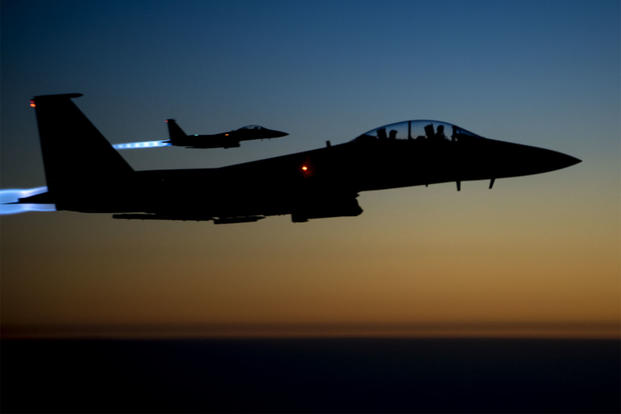U.S. forces have continued air and artillery strikes in Syria against Islamic State targets and will conduct them indefinitely despite President Donald Trump's announcement Dec. 19 that U.S. troops would withdraw from the country, the U.S. military regional command said Friday.
In a release, Combined Joint Task Force-Operation Inherent Resolve (CJTF-OIR) said that U.S. and coalition forces conducted 469 strikes with either air or artillery in Syria between Dec.16 and Dec. 29 against a range of ISIS targets and in support of the U.S.-backed Syrian Democratic Forces (SDF) in northeastern Syria.
The strikes were carried out using a variety of platforms, including fighters, attack aircraft, bombers, rotary-wing and remotely piloted aircraft, rocket-propelled artillery and ground-based tactical artillery, the task force said.
There is no immediate cutoff date for the air and artillery strikes, CJTF-OIR said.
U.S. forces "will continue to target ISIS" and "will remain committed to the enduring defeat of ISIS to improve conditions for peace and stability in the region," the release stated.
In addition to the U.S. and coalition strikes, Iraqi fighter aircraft have also attacked ISIS targets inside Syria in recent days.
Iraq's Joint Operations Command in Baghdad said Monday that Iraqi F-16s hit a house near the Iraqi border that was being used for meetings by ISIS leaders. The attack Monday came a day after Syrian President Bashar al-Assad said he had no objections to Iraqi cross-border strikes that were limited to the remnants of ISIS in eastern Syria.
Commanders of the SDF, which has driven ISIS out of most of eastern Syria, initially charged that Trump's withdrawal announcement amounted to a betrayal that would leave them prey to threatened attack by Turkey, but SDF fighters have continued to press the offensive against ISIS near the Iraqi border, according to the Syrian Observatory for Human Rights monitoring group.
Turkey considers the Kurdish YPG (People's Protection Units), the main fighting force within the SDF, to be linked to the PKK (Kurdistan Workers Party), which has been labeled a terrorist group by the U.S., Turkey and the European Union.
In another sign that the U.S. is continuing to support the SDF, the Observatory said Friday that U.S. troops were conducting patrols in the flashpoint town of Manbij in northeastern Syria near the Turkish border. Turkey has demanded that elements of the SDF in Manbij leave the town and withdraw east of the Euphrates River.
Since his withdrawal announcement, which prompted the resignation of Defense Secretary Jim Mattis, Trump has repeatedly backed up his intention to bring home U.S. troops from Syria, but said the withdrawal would be "slow and coordinated."
At a White House Cabinet meeting Wednesday, Trump said, "We've had a tremendous success in Syria and "we're slowly bringing people back."
He added, "We are doing something that, frankly, if I would have told you two years [ago], when we first came into office, that we would have had that kind of success, nobody would have believed it."
-- Richard Sisk can be reached at Richard.Sisk@Military.com.












